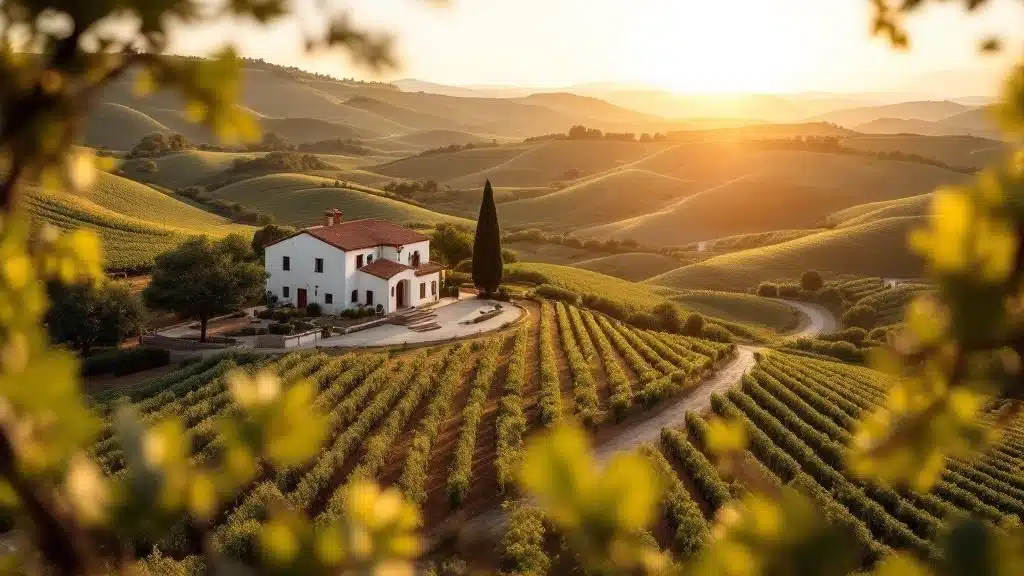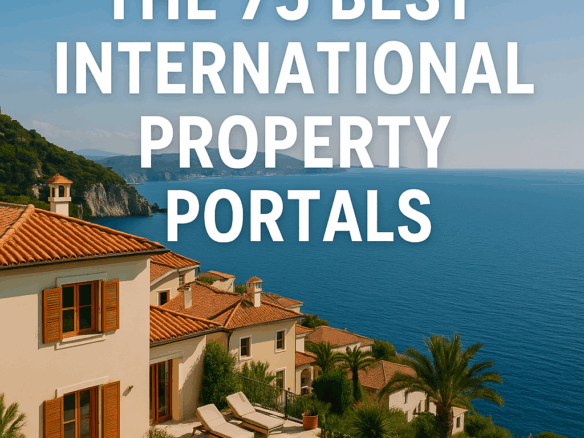When you begin searching for farms for sale in Portugal, you’re not just exploring property listings; you’re tapping into a lifestyle built on sunshine, rich heritage, and compelling investment value. It’s no surprise that discerning international buyers are flocking to the country’s famous quintas and sprawling herdades. These rural estates offer a rare blend of idyllic living and strategic investment potential, often at prices that are increasingly difficult to find elsewhere in Western Europe.
The Enduring Allure of Owning a Portuguese Farm
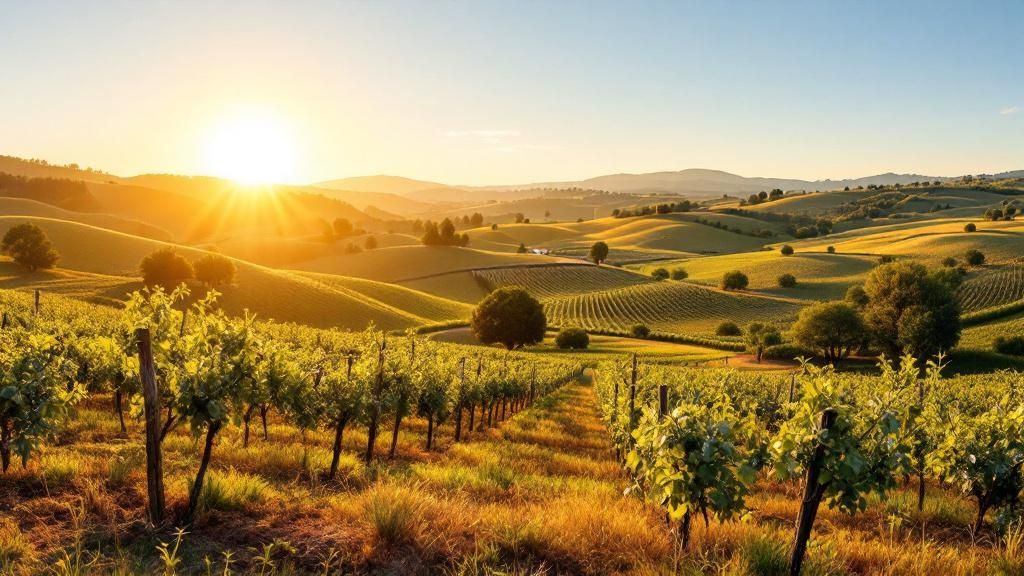
Imagine waking to panoramic views of ancient olive groves, sun-kissed vineyards, or rows of fragrant orange trees. This is the vision driving significant demand for rural real estate in Portugal. For international buyers, whether they are astute investors from the USA or lifestyle seekers from across Europe and even South America, the appeal extends far beyond a picturesque landscape.
A Portuguese farm is more than a standard urban investment; it’s a tangible, hard asset that delivers both personal enrichment and financial upside. It offers a genuine connection to the land and an entry point to a more measured, authentic way of life.
A Synthesis of Lifestyle and Investment
The true appeal of these properties lies in their dual character. On one hand, they are a private sanctuary—a place for family, for relaxation, and for escaping the relentless pace of modern life. On the other, they are a launchpad for entrepreneurial ambitions. The fertile soil and benevolent climate open up a world of possibilities for high-value agriculture or exclusive hospitality ventures.
This unique combination makes investigating farms for sale in Portugal a strategic move for a diverse range of buyers. Consider the potential:
- Boutique Vineyards: Craft your own signature wine in regions celebrated globally for their terroir.
- Olive Oil Estates: Harvest your own olives to produce high-quality, artisanal olive oil with proven market demand.
- Luxury Rural Tourism: Transform a historic manor house into an exclusive guesthouse or a high-end wellness retreat.
- Sustainable Living: Establish a sophisticated permaculture project or create a self-sufficient, off-grid homestead.
This is not merely about buying a house; it’s about acquiring a legacy and a business simultaneously. This is what truly sets the Portuguese rural market apart.
Why Portugal Commands Global Attention
While other European countries possess rural charm, Portugal offers a specific set of advantages that resonate with today’s international investors. The nation’s political stability, excellent safety record, and genuinely welcoming culture create a secure and comfortable environment for deploying capital and establishing roots.
The value proposition is significant. When you compare what your investment capital secures in Portugal versus similar rural properties in France, Italy, or Spain, you’ll frequently find you acquire far more land and property for your outlay. This affordability, combined with an exceptional quality of life, makes the dream of owning a European country estate an attainable goal.
As you delve into the different types of farms for sale in Portugal—from the grand herdades of the Alentejo to the charming quintas of the north—you’ll discover a landscape brimming with potential.
To assist your initial research, here is a quick-reference guide summarising the key points for any international buyer considering a farm in Portugal.
Portugal Farm Buyer’s Quick Reference Guide
| Aspect | Description |
|---|---|
| Property Types | Quintas (smaller estates, often with a manor house) and Herdades (large agricultural estates, common in the Alentejo). |
| Investment Appeal | Dual-purpose: serves as a lifestyle asset (private residence, holiday home) and a potential business (tourism, agriculture). |
| Key Opportunities | Winemaking, olive oil production, rural tourism (agriturismo), eco-projects, and luxury retreats. |
| Market Advantage | More affordable than comparable rural properties in other Western European nations like France, Spain, or Italy. |
| Key Regions | Alentejo for large-scale farming; Douro Valley for vineyards; Algarve for citrus and tourism; North for traditional quintas. |
| Buyer Environment | Politically stable, high safety index, and a welcoming attitude towards foreign investors and residents. |
This guide is designed to help you navigate this exciting market and find the perfect property that aligns with your vision, whether for personal fulfilment, a new business venture, or both.
Exploring Portugal’s Prime Agricultural Regions
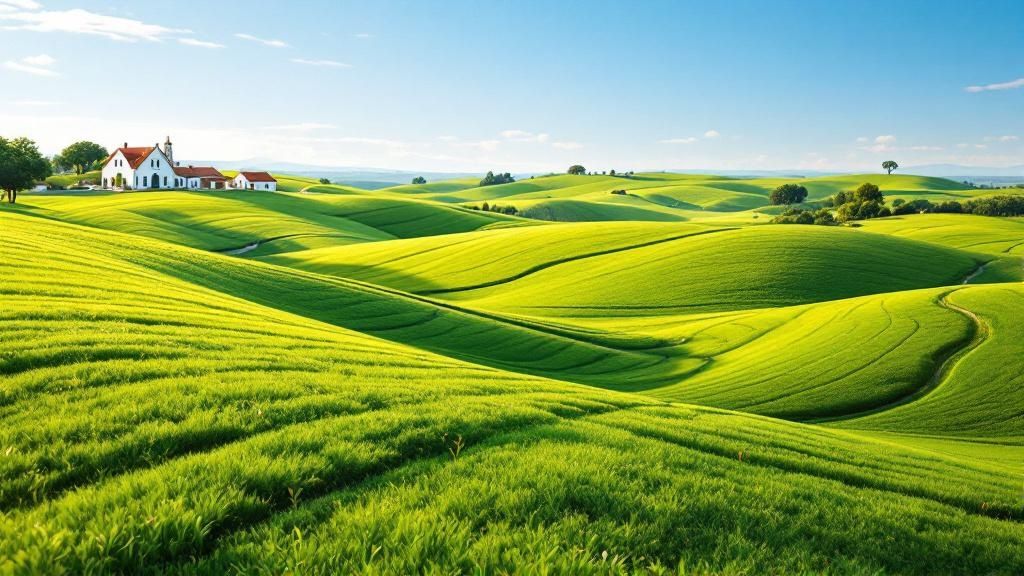
Portugal’s appeal lies in its diversity. The ideal farm for one investor will differ completely from another’s because the character of the land, the climate, and local culture shift dramatically across the country. Securing the right location is the first and most critical step in finding the perfect farm for sale in Portugal that fits your objectives.
This isn’t merely about selecting a location on a map; it’s about matching the landscape to your lifestyle and strategic goals. From the vast, sun-drenched plains of the south to the lush, green hills of the north, each region presents a unique canvas.
Let’s explore the prime regions attracting the most interest from sophisticated international buyers.
Alentejo: The Grand Scale of Portuguese Agriculture
Often called the heartland of Portugal, the Alentejo is a region of immense scale and breathtaking beauty. This is the domain of the herdade—sprawling agricultural estates that can stretch for hundreds, sometimes thousands, of hectares. The landscape here is defined by rolling plains, ancient cork forests, and world-class vineyards.
This is the region for ambitious agricultural ventures or large-scale tourism projects. Its wide-open spaces are perfectly suited for:
- Commercial Vineyards: The Alentejo produces some of Portugal’s most celebrated red wines, making it a hotspot for investors looking to establish their own label.
- Cork and Olive Production: As the world’s leading cork producer, the region offers long-term, sustainable income from its iconic cork oak trees.
- Luxury Rural Retreats: The sheer scale of the herdades allows for the development of exclusive hotels, private hunting estates, or sprawling wellness centres that offer unparalleled privacy.
Investing in the Alentejo is a statement of intent. It’s for those who think big and seek a property with significant commercial or agricultural scope, wrapped in a sense of tradition that is increasingly rare in modern Europe.
The North and Minho: Quintessential Charm
In stark contrast to the Alentejo’s vast plains, Northern Portugal—especially the Minho region—offers a landscape of verdant, rolling hills and intimate valleys. This is the land of the traditional quinta, charming country estates often built around a historic granite manor house.
These properties are ideal for those seeking a more personal, hands-on project. The fertile soil and milder, wetter climate support everything from boutique winemaking (this is the home of Vinho Verde) to organic farming. Many of these quintas are also perfectly positioned for high-end hospitality.
“The North offers a different pace. It’s about heritage, boutique experiences, and a deep connection to the community. Astute investors are converting historic quintas into sought-after wedding venues and B&Bs, tapping into a market that values authenticity and charm,” notes Nick Marr, founder of Homesgofast.com.
For buyers dreaming of a family-run farm, a small-scale vineyard, or a boutique guesthouse, the North provides the perfect backdrop. You’ll find many attractive farms for sale in Portugal here, offering a wonderful blend of lifestyle and manageable business potential.
Central Portugal and the Silver Coast: A Balanced Approach
For investors who desire a bit of everything, Central Portugal and the Silver Coast present a compelling middle ground. This region strikes a perfect balance between rustic tranquillity and modern convenience, with easy access to vibrant cities like Coimbra and charming coastal towns.
The area is a mosaic of small farms, forests, and river valleys, providing a diverse range of opportunities. You might find a riverside property perfect for an eco-tourism project, a smallholding ideal for a self-sufficient lifestyle, or a traditional stone farmhouse awaiting renovation. The Silver Coast adds the bonus of stunning beaches just a short drive away.
This balance makes it an excellent choice for:
- Lifestyle Buyers: Individuals who want a rural home without feeling disconnected from urban amenities.
- Mixed-Use Projects: Combining small-scale agriculture with rental cottages for a diversified income stream.
- Retirees: Those seeking a peaceful setting with strong infrastructure and healthcare access nearby.
The Algarve Hinterland: A Sophisticated Alternative
While the Algarve is globally renowned for its golden beaches and golf resorts, its hinterland offers a different kind of magic. Drive just a short distance from the bustling coast, and you’ll discover a serene world of rolling hills, orange groves, and sleepy whitewashed villages. This is where savvy buyers are finding exceptional value away from the main tourist hubs.
The inland Algarve is a prime location for anyone looking to cultivate high-value crops like citrus fruits, avocados, and carobs. Its unique microclimate and proximity to a major international airport also make it a fantastic spot for exclusive wellness retreats or private estates that offer both seclusion and easy access. Looking for farms for sale in Portugal in this lesser-known area can uncover properties with immense potential.
Understanding Market Dynamics and Investment Potential

For any discerning international investor, a sound deal is about more than just aesthetics. It’s about understanding the market forces at play. Gaining a genuine feel for the dynamics shaping Portugal’s rural property landscape is what separates a good acquisition from a truly exceptional one.
The market for farms for sale in Portugal is not just driven by aspirations of a sunny lifestyle; it’s underpinned by solid economic fundamentals that signal real, long-term potential. We’re observing a powerful confluence of soaring international demand and a genuinely limited supply of quality rural estates. This creates a compelling sweet spot for investors, where the right property can deliver both capital growth and a safe harbour from volatility in other markets.
Pricing Trends and Regional Value
Portugal’s property market has proven its resilience, but the real story for farm buyers is the incredible value found in rural areas compared to the saturated cities and coastlines. While national average prices provide a baseline, the true insights lie in the regional data.
Data from early 2025 paints a clear picture. While the national average property price was around €1,615 per square metre, rural properties in sought-after regions like the Alentejo or Central Portugal offer a much more accessible entry point. Here, you’ll often find prices between €800 and €1,400 per square metre.
That is a world away from prime coastal hotspots, where prices can easily rocket past €3,000 per square metre. This disparity highlights the massive value proposition that farms for sale in Portugal represent for investors who want their capital to work harder.
“Portugal’s rural real estate market offers a rare combination of lifestyle appeal and long-term value resilience, making it a strategic choice for discerning international investors,” says Nick Marr, founder of the luxury property portal EuropeanProperty.com.
The Power of International Demand
The engine driving much of this activity is the steady, robust interest from foreign buyers. We are seeing a wave of sophisticated investors from North America (primarily the USA) and Northern Europe—especially the UK, Germany, and the Netherlands—who are highly active in this space.
These are not just individuals buying a small holiday cottage. They are acquiring substantial estates, often with cash, and transforming them into profitable businesses or stunning private sanctuaries. This is a discerning group of buyers who recognise the potential in renovated properties, well-maintained farms, or estates ripe for conversion into eco-retreats and boutique guesthouses. Consequently, high-quality, turn-key farms tend to be acquired quickly.
Navigating the Investment Landscape
Even with Eurozone mortgage rates for non-residents hovering between 3.5% and 4.5%, investor appetite remains strong. The fundamental appeal of owning a piece of the Portuguese countryside ensures that demand continues to outstrip the limited supply of premier farms coming to market.
This dynamic creates a market where a strategic approach is paramount. To truly capitalise on these trends, one must understand the principles of property investment. For those new to this asset class, building a solid foundation of knowledge is essential. You can start by exploring our comprehensive beginner’s guide to investment properties, which covers core principles applicable to any market.
It’s this blend of steady foreign demand, attractive pricing, and a finite inventory that makes the market for farms for sale in Portugal such a standout opportunity for global investors in 2025 and beyond.
Navigating the Purchase Process Like an Expert
Acquiring one of the many appealing farms for sale in Portugal is a surprisingly straightforward process, even for international buyers. Provided you understand the key steps and local protocols, the journey from identifying your ideal farm to holding the keys is a clear, logical sequence designed to protect all parties involved.
The key to a seamless purchase is assembling the right professional team and understanding each member’s distinct role. For any non-Portuguese resident, the entire venture begins with one crucial administrative step.
Your First Step: Securing a NIF Number
Before you can make an offer or open a Portuguese bank account, you must obtain a tax identification number. It is called the Número de Identificação Fiscal (NIF).
Consider this unique nine-digit number your passport to the Portuguese system. It is required for nearly every official transaction, from signing contracts to paying property taxes. You can obtain one efficiently through a lawyer, a specialised service, or by visiting a local Finanças (tax office). Securing this early is a top recommendation—it prevents significant headaches and delays later in the process.
Assembling Your Professional Team
In Portugal, there are two key professionals you will work with when buying property: a lawyer (advogado) and a notary (notário). To an outsider, their roles might seem to overlap, but they are entirely distinct and equally vital for a secure transaction.
- Your Lawyer: This is your personal advocate. An independent lawyer works exclusively for you. Their role is to conduct comprehensive due diligence. They will investigate the property’s history for debts, verify land registry details, ensure all building licenses are in order, and confirm the seller has the legal right to sell. They are your primary line of defence.
- The Notary: The notary is a neutral public official who does not take sides. Their role is to officiate the final act: witnessing the signing of the final deed (Escritura de Compra e Venda), verifying the identities of all parties, and officially registering the sale with the state.
For a major investment like a farm, engaging your own independent lawyer is not merely a suggestion—it’s essential for protecting your interests at every stage.
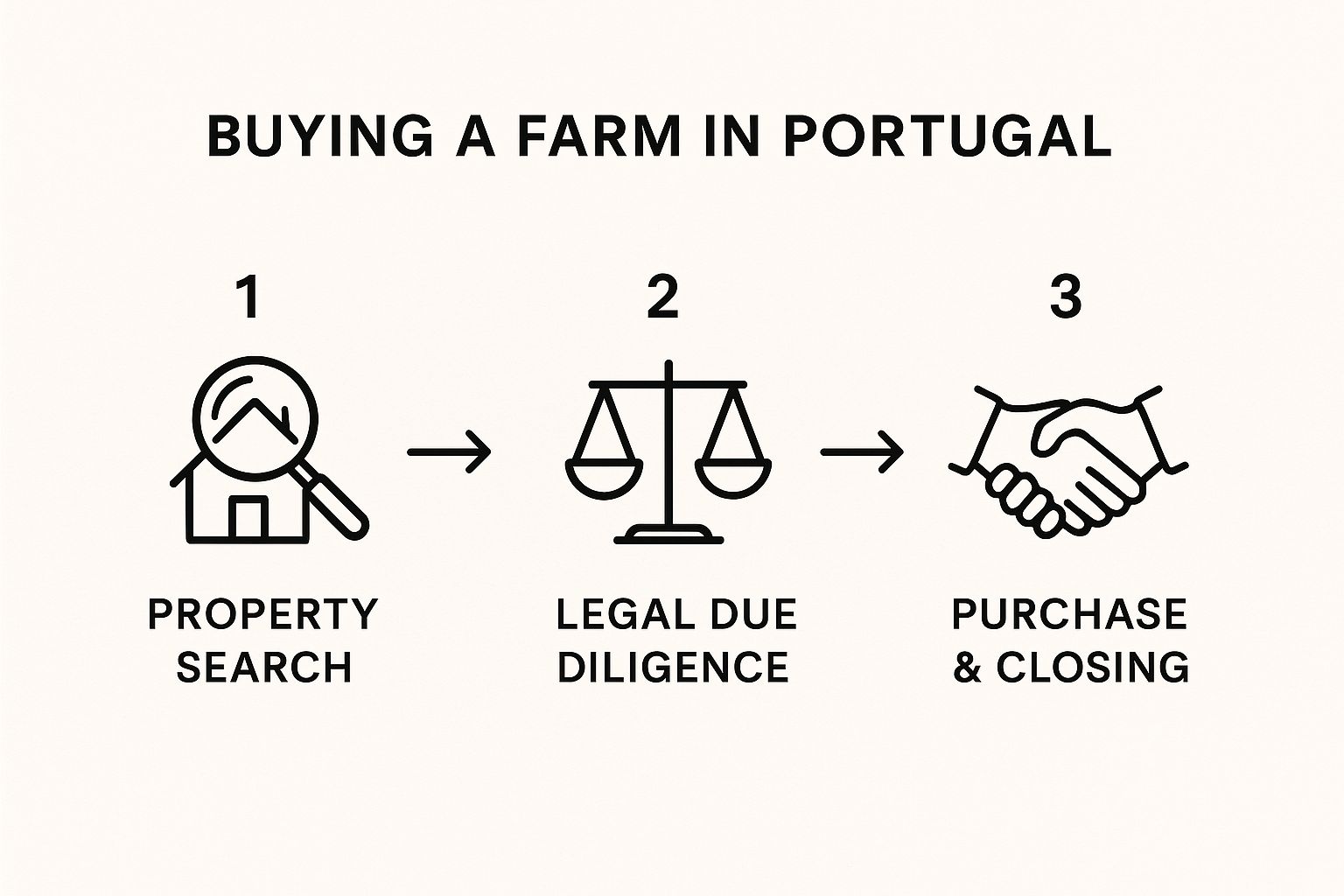
As you can see, the path is well-defined. With the right professionals in your corner, the process is logical and far less daunting than it might first appear.
Key Contracts and Financial Commitments
The acquisition itself occurs in two main stages, each cemented with a legally binding contract.
- Promissory Contract (CPCV): The Contrato de Promessa de Compra e Venda is the initial agreement that officially secures the deal. Upon signing, you will pay a deposit, typically between 10% and 30% of the purchase price. This contract outlines all terms—price, completion date, and any negotiated special conditions.
- Final Deed (Escritura): This is the final stage, signed before the notary. At this point, the remaining balance is paid, and the farm is officially yours. Ownership is formally transferred.
Of course, before signing contracts, your finances must be fully arranged. While many international buyers use cash, it is useful to know that Portuguese banks are quite open to offering non-resident mortgages. To understand what lenders look for, our in-depth guide to financing overseas property is an excellent starting point.
Since a farm is often a business venture, it is also wise to explore different small business funding options that could assist with the purchase or initial operational costs.
Understanding the Full Cost
The agreed-upon price for the farm is not the final figure you will pay. It is critical to budget for the associated taxes and fees to avoid surprises on closing day.
The two main taxes you will encounter are:
- Property Transfer Tax (IMT): This is a progressive tax based on the property’s value.
- Stamp Duty (Imposto do Selo): A much simpler tax, this is a flat rate of 0.8% of the property value.
When you add these acquisition costs to your legal and notary fees, you will have a true picture of your total investment. This level of preparation ensures a smooth, predictable, and ultimately successful purchase of your new Portuguese farm.
Discovering Your Ideal Farm and Its Potential
In Portugal, the term ‘farm’ encompasses incredible diversity, with each property holding its own unique character and potential. Before you begin reviewing listings for farms for sale in Portugal, the first step is to align your personal vision with what the land can realistically offer.
It’s not just about acres or square metres; it’s about the lifestyle and business potential inherent in the property’s DNA. Whether you envision a large-scale agricultural business or a small, self-sufficient homestead, Portugal’s countryside has an option to suit.
Defining Your Portuguese Dream Estate
The rural landscape is primarily shaped by two main property types, each holding a different appeal for buyers from around the world.
- Quintas: Consider these the classic Portuguese country estates. A quinta typically features a main house, often a beautiful traditional manor, surrounded by a manageable parcel of land. They are perfectly suited for establishing a boutique vineyard, an olive grove, a charming B&B, or simply creating a stunning private family residence.
- Herdades: Mostly found in the expansive landscapes of the Alentejo region, herdades are large-scale agricultural estates. These are serious working properties, sometimes covering hundreds of hectares, dedicated to commercial ventures like wine production, cork harvesting, or livestock. They represent a major investment into the heart of Portugal’s agricultural heritage.
Of course, beyond these two categories, you will find numerous smaller hobby farms and rural plots for those seeking a simpler, more direct connection with the land. For a closer look at the different kinds of agricultural properties available, you might find our guide on the seven types of farms to consider for ownership helpful.
Unlocking the Commercial and Lifestyle Potential
The true magic of these properties is the breadth of their potential. A farm in Portugal is a blank canvas for your ambitions, with many proven avenues to profitability.
Consider the possibilities: a historic quinta in the Douro Valley is not just a home—it could become a sought-after, high-end wedding venue. A sun-drenched herdade in the Alentejo can produce world-class olive oil while also hosting exclusive agritourism guests seeking a genuine rural escape.
The greatest opportunity for investors often comes from creative diversification. Blending traditional agriculture with modern, high-end tourism builds a resilient business model that attracts a global audience hungry for authentic, quality experiences.
The country’s significant agricultural footprint provides a solid foundation for these ventures. As of 2022, agricultural land constituted almost 42.8% of Portugal’s total area, a figure that speaks volumes about its deep farming roots. This vast expanse—from fields and pastures to permanent croplands—highlights the availability and importance of these rural properties for both production and investment.
The Rise of Sustainable and Niche Ventures
A powerful trend is emerging among those searching for farms for sale in Portugal: sustainability. An increasing number of buyers are pursuing projects that extend beyond traditional farming.
This shift is opening up exciting investment opportunities:
- Permaculture Farms: Creating self-sufficient agricultural ecosystems designed to work in harmony with nature, not against it.
- Eco-Retreats: Developing wellness centres and off-grid getaways that focus on yoga, nature, and sustainable living.
- Organic Farming: Meeting the growing global demand for high-quality, chemical-free food, from vegetables to specialty fruits.
By matching the right property type with a robust business plan—whether for commercial agriculture, upscale tourism, or a sustainable living project—you establish a clear path to success. This strategic thinking transforms buying a farm into a lasting legacy investment.
Future-Proofing Your Rural Investment
A savvy investor knows the real work begins after the purchase. Acquiring a farm in Portugal is one thing, but ensuring it matures into a valuable, resilient asset for generations to come requires a forward-looking mindset.
You must look beyond today’s market and consider the forces that will shape your property’s value over the long term. This includes everything from water security to the undeniable global shift towards sustainability. Getting this right is what separates a good purchase from a great legacy investment.
Navigating Land Scarcity and Regulation
One of the most significant factors supporting rural property values in Portugal is simple: land is a finite resource. In fact, agricultural land has been quietly declining for decades. The total farming area dropped from around 823,390 hectares in 1966 to just 672,210 hectares by 2021—a trend that is not reversing.
This growing scarcity provides a powerful tailwind for property values. However, it also means you must be exceptionally diligent about local land use regulations, or zoning. A misstep here can be a costly error.
Before making an offer, you must investigate:
- Water Rights: Is the property’s water access legally guaranteed? Verify every source, whether it’s a well, a borehole (furo), or a municipal connection. Independent verification is crucial.
- Land Use Regulations: Obtain the local municipal plan, the Plano Diretor Municipal (PDM). This document is your guide—it details exactly what you can build, farm, or develop on the land.
- Reclassification Potential: For some investors, the ultimate goal is turning agricultural land into developable land. It’s a long, complex, and often political process, but exploring the possibility could unlock enormous future value.
For a deeper dive into these market dynamics, you can explore detailed agricultural land forecasts for Portugal.
The Growing Value of Sustainability
Not long ago, “eco-friendly” was a niche concept. Today, it is a significant driver of property value. Farms that embrace sustainable practices are not just better for the environment; they are more resilient, more profitable, and far more attractive to the modern buyer or high-end tourist.
Think of it as embedding value directly into the soil itself.
Adopting these practices is a direct investment in your farm’s future:
- Eco-Certifications: Obtaining an official organic or biodynamic certification is more than a label. It can dramatically increase the price you command for your produce and elevates your entire property as a premium brand.
- Regenerative Farming: This is about actively improving the land. Practices that build healthy soil and increase biodiversity create a more self-sustaining farm, cutting costs and improving output over time.
As you plan for the long term, do not overlook innovative income streams. A prime example is agrivoltaics, where solar power generation is integrated with agricultural practices. This approach can slash your energy bills while creating a new source of revenue.
By focusing on these forward-looking strategies, you are doing more than just buying a piece of land. You are crafting an enduring legacy—ensuring the farm for sale in Portugal you choose today becomes a treasured and profitable asset for tomorrow.
Your Questions Answered: Buying a Farm in Portugal
Diving into the Portuguese farm market is an exciting prospect, but it naturally comes with many questions. For anyone considering farms for sale in Portugal, getting clear, straightforward answers is the first step toward a well-informed investment.
Let’s address some of the most common queries from international buyers.
Can a Foreigner Get a Mortgage to Buy a Farm in Portugal?
Absolutely. It is quite common for non-residents to secure a mortgage from a Portuguese bank. You can typically expect lenders to finance around 60-70% of the property’s official appraised value.
Lenders will require comprehensive proof of income and a healthy credit history. The mandatory first steps, however, are obtaining your Portuguese NIF (tax number) and opening a local bank account, as these are non-negotiable for any mortgage application in Portugal.
What Are the Primary Taxes Involved in the Purchase?
When budgeting for your farm, remember that the agreed-upon price is not the final figure. You must account for two key taxes on acquisition.
- Property Transfer Tax (IMT): This is a variable tax that changes based on the farm’s value and type, calculated on a progressive scale.
- Stamp Duty (Imposto do Selo): A much simpler, flat-rate tax fixed at 0.8% of the property’s declared value.
Once you own the farm, you will also be liable for an annual Municipal Property Tax (IMI), the rates of which can differ between municipalities.
Do I Need a Lawyer to Buy Property in Portugal?
While not legally mandatory, engaging an independent lawyer (advogado) is one of the most prudent decisions you can make, especially when dealing with rural properties, which often have their own unique complexities.
A good real estate lawyer works exclusively for you. Their job is to conduct deep due diligence—verifying property deeds, checking for hidden debts or liens, confirming building licenses are in order, and scrutinising every contract. For an international buyer, their expertise is invaluable for a secure and smooth transaction.
About Homesgofast.com
HomesGoFast.com is a leading international property website, established in 2002, helping homeowners, real estate agents, and developers reach overseas buyers. Featuring thousands of listings from over 50 countries, the platform connects global property seekers with homes, apartments, villas, and investment opportunities worldwide.
Looking for expert mortgage guidance? Get international property mortgage advice here:
👉 https://homesgofast.com/mortgages-overseas/
Explore more overseas homes for sale at our global partner site:
👉 https://homesgofast.com/overseas-property/
Looking to sell real estate to foreign buyers
https://homesgofast.com/sell-overseas-property/

